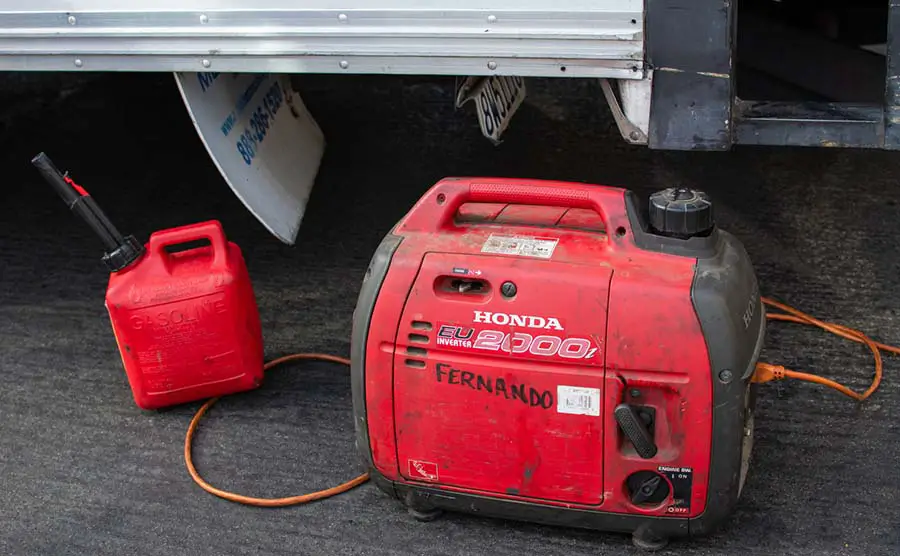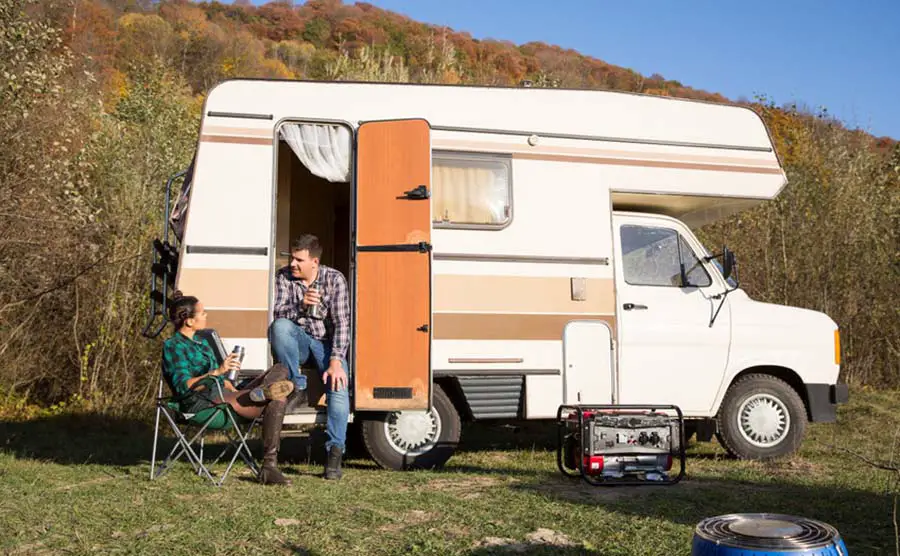
With the vast array of state forests, national parks, state parks, heritage parks, and recreational trails in the United States, camping has never been more popular. Millennials, in particular, are showing an increasing interest in recreational vehicles (RV), and more than fifteen million of them in the US own an RV. To fully enjoy camping in an RV, a portable generator is a must for those who don’t wish to sacrifice all of their creature comforts while enjoying the great outdoors.
There are many great generators for RV camping, including ones by Honda, Yamaha, Champion, Briggs and Stratton, WEN, and Westinghouse. When choosing an RV camping generator, it must be lightweight, portable, have a decent run time, and not be too loud, or it will disturb nearby campers.
Portable inverter generators are much quieter than conventional ones. Many fifth-wheel RVs and motorhomes are designed and equipped for use with a built-in generator, but travel trailers, some fifth-wheel RVs, and many other camping vehicles aren’t. This is where a portable generator comes into its own.
Best Portable Generators for RV Camping
Below are some of the best portable generators for RV camping that are sure to work well and meet all of your needs. Make sure to carefully assess what you want in an RV camping generator so you can choose one that meets your needs and is perfect for your situation.
| Generator | Weight | Running Watts | Run Time | Loudness |
| Yamaha EF 2000iSv2 | 44.1 lbs | 1,600 | 10.5 hrs at 1/4 load | 51.5 dB |
| Honda EU3000is | 145 lbs | 2,800 | 20 hrs at 1/4 load | 58 dB |
| Champion 3400 Watt | 95.7 lbs | 3,100 | 7.5 hrs at 1/4 load | 59 dB |
| Honda EU2000i | 45.6 lbs | 1,600 | 8 hrs at 1/2 load | 59 dB |
| Briggs and Stratton P2200 | 54.6 lbs | 1,700 | 8 hrs at 1/4 load | 59 dB |
| Briggs and Stratton P3000 | 85 lbs | 2,600 | 10 hrs at 1/4 load | 58 dB |
| WEN 56380i | 99.2 lbs | 3,400 | 8.5 hrs at 1/2 load | 57 dB |
| Westinghouse WGen7500 | 92 lbs | 7,500 | 16 hrs at 1/4 load | 64 dB |
1. Yamaha EF 2000iSv2 Portable Generator
This generator is a bit cheaper than the Honda EU2000i, and it is also lighter and almost as quiet. It has 1600 watts of running power with a peak of 2000 watts and a United States Forest Services approved spark arrestor. The Yamaha EF 2000iSv2 is an inverter generator, so it offers clean power for sensitive electronic devices. Weighing in at only 44.1 pounds, it is highly portable and compact.
You can run two of them in parallel if extra power is needed. At a twenty-five percent load, the sound level is between 51.5 and 61 dBA. It can run for up to ten and a half hours on a single gas tank at a twenty-five percent load. The tank capacity is 1.1 gallons, and it comes with a limited three-year warranty.
Its Smart Throttle feature and load-sensing control allow for increased fuel efficiency as it automatically adjusts the engine speed to match the load. An oil watch warning system prevents engine damage, a fuel gauge, two 120V AC outlets, and one DC outlet. In addition, it comes with a pull start and a carry handle on top. Some reviewers rated it higher than the Honda as it has a fuel gauge, comes with car AC cables, and fuel shutoff that allows the carburetor to run dry, which the Honda does not.
It won’t run an RVs air-conditioning and a microwave simultaneously, but it did work with one reviewer’s single small RV air-conditioner unit. The generator comes with a DCV battery charger cable and sparkplug wrench, but you must purchase the oil yourself.
2. Honda EU3000is Portable Generator
This generator is rather large and operates at forty-nine to fifty-eight decibels. However, it is still sufficiently compact to fit in a travel trailer’s storage area or an SUV. Its peak power output is three thousand watts, and it offers two thousand eight hundred running watts, which is enough for an air-conditioning unit.
Depending on the load, the Honda EU3000is can run for around twenty hours on 3.4 gallons of fuel. It weighs one hundred and forty-five pounds and carries a three-year warranty. You can run two or more in parallel for increased power output if necessary, and there is an Eco-Throttle feature, which improves fuel efficiency.
One reviewer has had his for almost ten years and says it has been very reliable. However, if you want it to run the RV’s air-conditioning, you can’t use it to power anything else due to a change Honda made to the newer models. It has an electric start and an inverter to provide stable power for delicate electronics.
Another reviewer said he uses it to power an off-grid cabin with lights, microwave, coffee maker, toaster, oven, TV, and battery chargers. It comes with rubber feet that stop it from moving while running but needs two people to move it. There is a wheel kit that you can purchase separately. The generator will shut down automatically if it detects high carbon monoxide levels in its vicinity.
If the electric start doesn’t work for some reason, it also has a recoil start. Another safety feature is that it will shut off automatically if the oil is too low. It has been rated highly, with multiple reviewers saying that it powers a travel trailer easily and is very quiet.
3. Champion 3400 Watt Dual Fuel Portable Inverter Generator
This generator weighs 95.7 pounds, so it is a lot lighter than the Honda EU3000is. Starting watts is 3400 while running watts is 3100. It runs on gasoline or propane and is nice and quiet with a decibel level of only 59 dBA at 23 feet. When running on gasoline, it has a run time of up to seven and a half hours at a twenty-five percent load.
It is an inverter that can provide clean power for sensitive electronics. It is RV-ready with a 120V 30A RV outlet and two 120V 20A household outlets. There is also a 12V DC outlet with a dual USB adapter, and the Champion comes with a three-year limited warranty and free lifetime technical support. It runs fourteen and a half hours at twenty-five percent load with a twenty-pound propane tank.
There is an optional parallel kit for users wanting to run it in parallel with another generator. This allows for the connection of two 2800-watt or higher inverters. It comes with a battery for an electric start and has Cold Start Technology that ensures a quick start in freezing temperatures and has a recoil start for backup. Never-flat wheels are affixed to one end for ease of movement, and there is a fold-out handle.
This generator has an economy mode for quieter operation, improved fuel efficiency, and extended engine life. It can run two 15 000 BTU RV air conditioners and comes with a liquid propane hose. Reviewers have rated it highly for RV camping and point out that it costs less than the Honda EU3000is. Oil changes are easy because the drain plug has a hose already attached, so you just unclamp the hose, which is inserted into a metal plug, extend it and drain it.
Some users said it is a bit heavy, but another said it was light enough for him to lift it into the bed of his truck and low enough to fit under the tonneau cover. He also used it as a backup generator for his house to power the furnace, lights, and refrigerator. You must keep the battery charged if using gasoline as fuel because the pull start does not work if the battery is low.
4. Honda EU2000i Portable Inverter Generator

Honda has a good reputation concerning generators, and the Honda EU20001, at 45.6 pounds, is light to carry and relatively quiet. It puts out between fifty-three and fifty-nine decibels during operation because it has an inverter and comes with a three-year warranty.
The Honda EU2000i has an eco-throttle feature that enhances fuel efficiency, and the manufacturer claims it can run for just over eight hours on one gallon of gas. Its peak power output is two thousand watts, and the sizeable GX100 engine easily handles the power load. It provides reliable power to sensitive equipment and can power a TV, coffee pot, fridge, and satellite.
It has been rated very highly. One reviewer says he uses two of these generators in parallel to run his RV air conditioner and that they are easy to service and lightweight. He has run his older one for hundreds of hours, and it still works as well as the day he unpacked it.
It has quite a small fuel tank and won’t be suitable for powering heavy-duty appliances but is very reliable and easy to start. However, Honda generators have a reputation for being pricey.
5. Briggs and Stratton P2200 PowerSmart Inverter Generator
This inverter generator weighs fifty-five pounds and puts out 2200 surge watts and 1700 running watts. The one-gallon fuel tank allows for up to six and a half hours of continuous operation at a quarter load. There is a parallel connector port that can connect it to another generator for running in parallel.
It is safe to use with laptops, computers, TVs, and game consoles and has a USB port to charge portable electronics. The operating volume meets the standard at 59 decibels, and it has a recoil start. There are two 120V household outlets and one 12V DC outlet with a USB adaptor.
The Briggs and Stratton P2200 PowerSmart comes with a 24-month limited consumer warranty and weighs 54.6 pounds. Unlike the Briggs and Stratton P3000, it does not have a fuel gauge, hour meter, or wheels. In addition, it runs on unleaded gasoline only.
One happy reviewer in 2018 said his machine runs fourteen hours a day, and the fuel costs him less than six dollars a day. Another rated it at five stars, saying she used it to power some home appliances during power outages and that it cranks quickly with one turn of the pull start.
A third reviewer in 2016 said he was very impressed with it as it was very quiet and met all his power needs while camping. It ran fans, some small lights, and chargers for cellphones and tablets from 7 pm to 7:30 am when it ran out of gas. On the whole, it seems to have had mostly positive reviews. One reviewer in his seventies said the handle makes it easy for two people to carry, and it powered his RV rooftop AC and the refrigerator together with lights and radio.
One unhappy reviewer said he acquired two of them for his camper, but it would run for fifteen to twenty minutes and then shut off, and now he can’t get either of them to run for longer than eight or nine minutes at a time.
6. Briggs and Stratton P3000 PowerSmart Inverter Generator
The Briggs and Stratton P3000 PowerSmart is another generator with three thousand starting watts. Running watts is two thousand six hundred. It can run for ten hours on one and a half gallons of gas at a twenty-five percent load. It is an inverter that puts out clean power safe for electronics like cell phones, laptops, and game consoles.
The generator adjusts the engine speed to reduce noise and emissions and improve fuel consumption. It has only a recoil start and is not a dual fuel generator because it runs on gasoline. The tank holds 1.5 gallons (5.5 liters) of fuel. According to the manufacturer, it has a limited consumer warranty of 2 years and weighs eighty-five pounds.
An onboard LCD shows power use, run time, maintenance reminders, and an optional kit for running it in parallel with another generator. It has a low oil shutdown feature and an operating sound volume of fifty-nine dB. The two wheels at one end and a telescoping handle assist with mobility.
The control panel has four 120V household outlets, one 120C 30A outlet, one USB port, and one 12V DC charging outlet. Some customers have rated it quite highly as a home emergency generator, but one complained that it wouldn’t run his popup camper 10K BTU air conditioner on his RV.
Another reviewer in 2019 said that it starts quickly and isn’t too difficult to move, but he bought it to run a standard Coleman Mach air conditioner on his camper and was disappointed. No matter what mode he ran the AC unit on, it tripped the breaker on the generator. A different 2019 reviewer gave it one star complaining it was noisy when running the 13.5 BTU AC unit in his RV.
However, a 2018 reviewer said it runs his 13 500 BTU AC very well but won’t run the 15,000 BTU unit. He said he would consider running it together with another Briggs and Stratton generator, which would be enough to power his entire fifth-wheel RV.
Another used it successfully to run the AC on his travel trailer. He says it ran his 13 000 BTU RV air condition for five hours on two-thirds of a tank of fuel.
7. WEN 56380i Super Quiet 3800 Watt Inverter Generator
This inverter generator is very affordable compared to many others in its size range. It weighs 99.2 pounds and has a four-stroke engine that runs on gasoline. It has a fuel shutoff which allows the carburetor to run dry before it shuts down. This is useful if you want to store it for a while, as stale fuel does not sit in the carburetor for long periods.
The WEN 56380i produces three thousand eight hundred surge watts and three thousand four hundred running watts and has a half-load run time of around eight and a half hours. The fuel tank takes 2.2 gallons of gasoline, and the noise level at twenty-two feet is fifty-seven decibels. It comes with an Eco-Mode to improve fuel efficiency, two three-prong 120v outlets, one AC 120V NEMA TT-30R RV outlet, one 12V DC outlet, a 5V USB port, and a digital load and fuel display.
There are two wheels at one hand and a folding handle for ease of movement. Two of these generators can be linked up to run in parallel using the connection kit sold separately. The generator comes with a two-year warranty. Several reviewers said they were pleased with it and that it was powerful and quiet, but most seem to have used it around the home and not in an RV.
One said that he rented a twenty-six-foot camper for the weekend and used it to power the trailer, his PA speaker system, and two sets of large LED spotlights. The generator was at full load with the air-conditioning on, and a tank of gas lasted around four hours. Another reviewer said he used it to run his 13,500 BTU air-conditioner for eight hours on Eco mode, and it only used half a tank of fuel.
It has a push-button electric start, a digital wattage meter, and a spark arrestor that allows you to use it in all national parks and forests.
8. Westinghouse WGen7500 Portable Generator
If you need a bigger portable generator, the Westinghouse WGen7500 Portable Generator is worth considering. It comes with a remote key fob electric start, a push-button start, and a recoil start and outs out 7500 running watts and 9500 peak watts. The 6.6-gallon fuel tank has up to eleven hours of run time and a fuel gauge.
At one hundred and ninety-two pounds, it is pretty heavy, and it has a four-stroke engine. It runs only on gasoline had has an automatic low oil shutoff. Since it is not an inverter generator, it is loud. It has a transfer switch to connect it to the RV relatively easily, and the engine is mounted within a solid steel frame.
Many people may find this generator a bit big and heavy for use with an RV, but its large engine means it can run for between sixteen and eighteen hours.
Although users have rated it quite highly, most have used it around the home instead of in an RV. Some negative reviews are about the wheels (“cheap plastic”) and several about poor after-sales customer service and support.
Considerations Before Buying a Portable Generator for an RV

Firstly, portable generators come in different types and sizes, so you need to consider what size power output you need for your RV. This depends on the type and size of your RV, how long you need to run the generator, and the number of appliances you intend to use. For example, a larger RV with a higher power demand will require a bigger generator.
Generator Power
If you don’t intend to power too many electronic devices and your RV is relatively small, then you only need a small one with an output of around 2000 watts.
It is advisable to calculate how much power output you will need based on the number of appliances and other electronic devices you will be running. Generally, an output of between two thousand and three thousand watts will be sufficient for a few simple RV appliances, a cell phone, and a laptop. However, if you want that home-away-from-home experience with lights, computers, a TV, a microwave, air conditioning, and hot water, you will need a more powerful generator.
You need to ask yourself how many of your appliances and devices will be drawing power simultaneously. You can manage with a smaller generator even if you have quite a few appliances but don’t run them all simultaneously. Air conditioners are usually the most power-hungry items in an RV.
A manufacturer usually gives generator output as startup watts (surge watts) and running watts (continuous watts). The former states the maximum power that the generator will produce in a short burst, such as that necessary to start an air-conditioning unit or a refrigerator. These appliances need more energy to start up than they do once they are running.
Running watts shows the power the generator can produce continuously. This number often appears in the generator model name, but sometimes it indicates the surge watts. You need to consider the startup watts of an appliance together with any load that is already running. If the generator is overloaded, the circuit breaker will trip, and any devices plugged into it and the generator itself could sustain damage.
Generator Noise
The second major factor to consider is noise. Conventional portable generators that run on gasoline or diesel can be pretty loud, and in a crowded campground, may not go down well with the neighbors or the Park authorities. However, the technology is constantly improving, and these generators are a lot quieter than they used to be.
Inverter generators also make a noise, but usually not as much as other types. A portable inverter generator will generate three-phase power, convert it to direct current (DC), and then invert the DC to120V, 60hz power. In this type of generator, the engine speed controls the amount of electricity produced, which results in lower fuel consumption and less noise.
Noise levels are a critical issue in State Parks, RV Parks, and National Parks, and the generator should ideally have a noise output of less than sixty dBA when measured at a distance of twenty-three feet.
Generator Size
Thirdly, when used for RV camping, generator size and portability is also a factor. Apart from the fact that a bigger generator may be noisier than a smaller one, you want it to be as compact and portable as possible to make it easier to fit into your RV and move around your campsite. Many generators labeled as portable can be extremely heavy to lift and are not easily carried, even by two people.
Generator Fuel
Fourthly, fuel type is also an important consideration. Portable generators can run on diesel, gasoline, or propane. Many inverter-type generators can run on more than one kind of fuel and are called dual-fuel generators. For instance, they can run off propane or gasoline, so dual-fuel inverter generators are often perfect for powering RVs. You are less limited by fuel options with a dual-fuel generator, but they put out slightly less power.
Diesel generators are more fuel-efficient than gasoline-powered, require far less maintenance, and have a longer lifespan. However, portable diesel generators for RVs are scarce as they are usually permanently built into RVs. They have a past reputation for being very loud, but many diesel generators nowadays are no more noisy than gasoline-powered ones.
Generator Efficiency
The fifth factor to consider is fuel efficiency. You don’t want to refuel the generator too often or carry large quantities of fuel with you on a trip, so the more fuel-efficient the engine is, the better. Also, if you intend to camp in freezing areas, generators that run on diesel or even gasoline may not start as quickly as those that run on propane.
Generator Starter
Other features to look out for when buying a portable generator are whether they have a push button (electric) start or a pull (recoil) start. The former is makes it much easier to start the generator. A remote starter is an even better option because you don’t have to go outside in inclement weather to start the generator. However, not many portable generators have this option.
Many camping grounds offer shore power, so if you only camp in these types of settings, you will not need a portable generator. However, if you want to go a bit further into the wilderness, a portable generator can make a significant difference to your camping experience.
Conclusions
Overall, inverter generators are better for RV camping than conventional ones as they make less noise and deliver cleaner power output. In addition, the dual-fuel generators offer better options for fuel transportation and storage, particularly if you are going on a long trip where fuel supplies are scarce. There is a wide range of portable generators for RV camping that are worth checking out.

